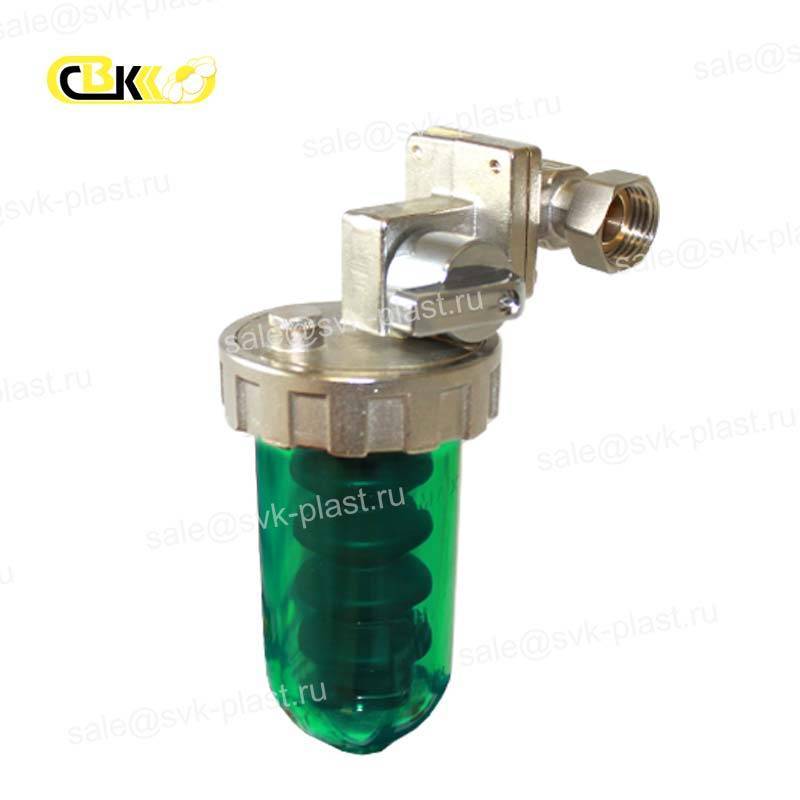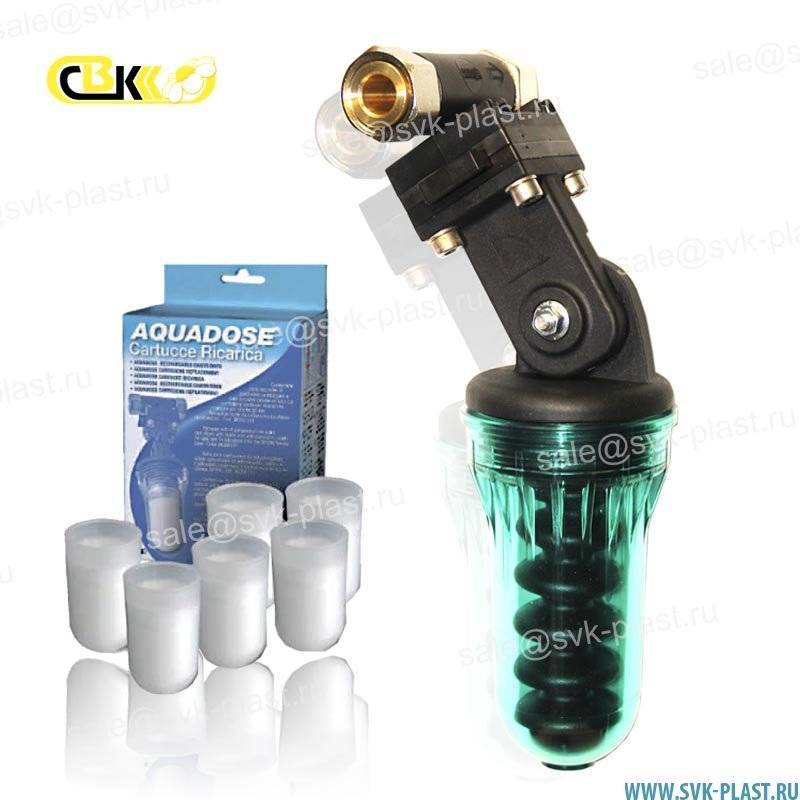AMG scale suppressors
AMG Water Filters is a dynamic company with extensive experience in the production of high-quality filters for water treatment intended for home and industrial use. The product range of AMG Water Filters consists of the following products:
- Filter housings
- Filter cartridge
- Filters with self-cleaning function
- Devices for descaling
- Dosing of polyphosphate
- UV sterilizers
- Accessories for pumps
All products are manufactured in Italy and certified according to the highest standards, which guarantees the strength and safety of materials. The excellent quality of AMG Water Filters products is achieved through continuous innovation and product improvement.
AMG Water Filters products are certified for use with drinking water.
Polyphosphate SVK Dose dispenser
| Vendor code | Name |
|---|---|
| SVKDose007 | Proportional polyphosphate SVK Dose dispenser |
AMG AQUADOSE polyphosphate dispenser
| Vendor code | Name |
|---|---|
| DP200 | AMG Proportional dispenser AQUADOSE DP200 |
| К000101 | AMG Cartridges with the polyphosphate dispenser (pack of 6 PCs) |
In AMG AQUADOSE dispensers, the proportional dosing system is equipped with a special device that provides a Venturi effect, which allows the dosage of polyphosphate in accordance with the EU Directive 98/83/CE for use with drinking water.
Technical characteristics of AQUADOSE DP200 dispensers:
- The dose of polyphosphate is 80g. One catridge is included with the device.
- Water capacity 15m3
- Overall dimensions of the device: 230x75x65
- Maximum working pressure: 8 bar
- Operating temperature of the device: from 5°C to +45°C
- Maximum working temperature of the solution: 80°C
- The cover is made of composite plastic with a brass rotary block
- Brass connection group size ½ ”
- Transparent body, main material is polyamide
- Horizontal or vertical installation is possible
- Bypass option
- Serviced building
Polyphosphate filter: purpose, device, varieties
Water quality differs from region to region, especially with regard to the level of hardness. Soft water with a low salt concentration practically does not leave a limescale on the heating elements of appliances used in everyday life (electric kettles, boiler equipment, dishwashers). Experts recommend using filtration systems to reduce the content of nitrates and increase the service life of household appliances. Polyphosphate filters are most popular among protective systems that prevent the appearance of deposits on the internal elements of water heaters. According to experts, equipment that works together with filter devices is much less likely to fail than equipment that is supplied with water without pre-treatment.
Purpose and use
Polyphosphate filters are used everywhere, and the low cost makes these products available to the mass buyer. Complex care of the filter is not required, it is enough to replace the crystals in it from time to time. This device reduces the rate of scale appearance, as a result, the probability of failure of heating elements and other parts is reduced. According to the reviews of many customers, the polyphosphate filter designed for boiler equipment is the most inexpensive way to Refine tap water, which greatly increases the service life of the equipment.
Design feature
Polyphosphate filters are quite simple. They include:
- Cap
- The main bulb
- Filler
- Drain
First, the liquid enters through the lid, then it is cleaned in the main flask and sent down the drain to the water heating equipment. If you decide to go to the store for a filtration device, first you need to decide which household appliances it will be used for. The fact is that manufacturers produce special modifications for different categories of water heating equipment. In modern models, there are 2 types of fillers: granular and powder.
Principle of operation
In most Russian regions, the quality of tap water leaves much to be desired, so many people are forced to use post-treatment systems. Often, water with a high content of heavy metals and other harmful substances flows from the tap. People who care about their health should consider installing a filtration system. It should be noted that hard water is absolutely harmless to people, which can not be said about household appliances. If the level of rigidity is exceeded, over time this will inevitably contribute to the failure of the equipment. But if you put a barrier in the way of hard water – a filtration system – it will flow through the sodium salt. This leads to the enveloping of hard salts and slows down the formation of limescale.
Varieties
Today, the market offers an incredible variety of water treatment devices. The filler can be poured into a special capsule through which water will flow, or it can be an integral part of the structure. In terms of design features, all water purifiers are divided into 2 types:
- Running
- Filter dispensers
Installation
Many new owners of household appliances forget to buy a filtration device for it. Often boilers and other equipment are operated without secondary treatment of tap water. This is why after purchasing a polyphosphate filter and before using it, you must first clean the heating elements with specialized chemicals.
For cleaning from lime scale, you should use non-abrasive solutions sold with washing agents. Under the influence of high temperatures, the chemical composition will gradually dissolve the plaque. Then the liquid should be poured out, the equipment should be thoroughly rinsed, and the heater should be turned off.
Only then can you start installing the filtration system. The installation method is determined by the type of equipment for which the water treatment device is intended. For example, in the case of a washing machine, it must be installed on a filling hose. The same should be done in the situation with a water-heating boiler. Compact and simple design make self-installation of polyphosphate filters very easy, as evidenced by the responses of ordinary users. They are also easy to maintain – you only need to periodically replace the filler sold in the corresponding stores.
Advantages
The polyphosphate filter is considered an effective and inexpensive tool for preventing the appearance of limescale. Its key advantages include:
- Compactness
- Easy installation
- High quality
- Ease of maintenance
Disadvantages
Polyphosphates also have certain disadvantages. If you choose the cheapest option, it is fraught with deterioration of water quality and too much resource consumption. Often, without an intermediate change of the cartridge, such filters serve no more than 6 months, since the film that appears as a result of a chemical reaction is rapidly dissolved under the influence of heated water. It follows that the user will be limited in choosing the washing mode, because the water temperature should not exceed 55°C.
In addition, it should be taken into account that during intensive operation of the polyphosphate filter, calcium and other salt deposits may form on its sides. Unfortunately, it can be quite difficult to remove them, and experts do not recommend preserving deposits on the surface, since further layer build-up can negatively affect the functioning of the equipment. Polyphosphate filters with a large accumulator containing salts are strictly forbidden to be used for purification of drinking water. You should also avoid prolonged contact with the skin.
Security concerns
Water that has been treated with such a system ceases to be drinkable and becomes technical, meaning it is no longer suitable for drinking and cooking. If we turn to the question of harm to health, we can say with confidence that the filter contains a chemical reagent, therefore, it is forbidden to use the water passed through it for any other purposes, in addition to washing, washing dishes and heating. However, if you suddenly accidentally or out of necessity put your hands in it, there will be no serious consequences, since the concentration of the reagent there is small. To maximize the protection of household appliances from damage, you should check the amount of remaining reagent from time to time. If there is less than half of it left, you need to completely change the filler, otherwise the level of protection will decrease.
Experts recommend using a powder reagent, as it allows you to ensure complete safety in operation. It will prevent not only the deposition of scale, but also the appearance of rust, which is often subject to heating elements. If you miss the moment and allow scale or corrosion to capture too large areas, you will inevitably need to change the heating element.
Conclusion
Polyphosphate filters allow you to protect expensive equipment from scale formation. Their price is affordable for most buyers, and self-installation is not difficult. Normally, it is enough to change the filler 2 times a year.






